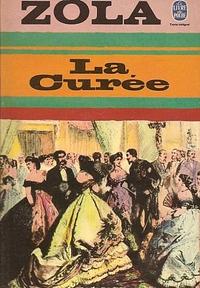You need to sign in or sign up before continuing.
Take a photo of a barcode or cover
J'ai adoré la première moitié, mais trop à faire pendant ces vacances et j'ai de toute manière dû quitter le lieu auquel il appartient. Il faudra que j'attaque tous les Rougon-Maquart à la suite dans un avenir plus ou moins éloigné tout de même.
dark
medium-paced
Plot or Character Driven:
Character
Strong character development:
Yes
Loveable characters:
Yes
Diverse cast of characters:
Yes
Flaws of characters a main focus:
Yes
challenging
dark
reflective
sad
medium-paced
Plot or Character Driven:
Character
Strong character development:
Yes
Loveable characters:
Complicated
Diverse cast of characters:
Yes
Flaws of characters a main focus:
Yes
dark
emotional
informative
reflective
sad
slow-paced
Plot or Character Driven:
Character
Strong character development:
Complicated
Loveable characters:
No
Diverse cast of characters:
No
Flaws of characters a main focus:
Yes
emotional
reflective
medium-paced
Plot or Character Driven:
Character
Strong character development:
Complicated
Loveable characters:
No
Diverse cast of characters:
Complicated
Flaws of characters a main focus:
Yes
Paris sat down to dinner and dreamed bawdy dreams for dessert.
La Curée is the second novel in the twenty-volume series of Les Rougon-Macquart featuring the greedy, calculating nouveau riche Aristide Rougon, the youngest son of ruthless, money grabbing Bonapartists, Pierre and Felicite Rougon of the first novel.
Thou shalt be rich!
The setting of the novel is Paris, a city bent on pleasure, immorality and adventure, where rogues rule, devious deals are made , consciences are sold and women are bought. In a word, Paris is drunk!
"What is it you want? What on earth do you dream of?..."
..."I want something different..."
La Curée is the second novel in the twenty-volume series of Les Rougon-Macquart featuring the greedy, calculating nouveau riche Aristide Rougon, the youngest son of ruthless, money grabbing Bonapartists, Pierre and Felicite Rougon of the first novel.
Thou shalt be rich!
The setting of the novel is Paris, a city bent on pleasure, immorality and adventure, where rogues rule, devious deals are made , consciences are sold and women are bought. In a word, Paris is drunk!
"What is it you want? What on earth do you dream of?..."
..."I want something different..."
dark
reflective
medium-paced
Plot or Character Driven:
Character
Strong character development:
Yes
Loveable characters:
Yes
Diverse cast of characters:
No
Flaws of characters a main focus:
Yes
Zola continues his "social study" with Aristide Rougon, now Saccard, in Paris. He seeks by all means to make a fortune. However, death takes his first wife when fate knocks on his door.
Once again, Zola brilliantly demonstrates the opportunism of an upstart. The character of characters worked to perfection. We feel the protagonists of the story come to life before our eyes.
It is also an opportunity for the author to highlight women's roles and positions. To others, simple objects are means for their husbands to obtain thanks for their intervention, power, or relations.
It is also a masterful demonstration of the frivolity and inconstancy of women who have always had money that burns their fingers—an exceptionally well-described relationship with the financier.
We must admit that Zola is the undisputed master of descriptions: living rooms, dresses, landscapes, and characters. By reading this author, we are in the middle of a film where everything is thought out and mastered.
I am often overwhelmed by Zola's writing, which is so cruel, cynical, and poetic at times.
I often wonder how a man could be so fair and precise in his social study, mainly since he was only about thirty when this novel appeared.
Once again, Zola brilliantly demonstrates the opportunism of an upstart. The character of characters worked to perfection. We feel the protagonists of the story come to life before our eyes.
It is also an opportunity for the author to highlight women's roles and positions. To others, simple objects are means for their husbands to obtain thanks for their intervention, power, or relations.
It is also a masterful demonstration of the frivolity and inconstancy of women who have always had money that burns their fingers—an exceptionally well-described relationship with the financier.
We must admit that Zola is the undisputed master of descriptions: living rooms, dresses, landscapes, and characters. By reading this author, we are in the middle of a film where everything is thought out and mastered.
I am often overwhelmed by Zola's writing, which is so cruel, cynical, and poetic at times.
I often wonder how a man could be so fair and precise in his social study, mainly since he was only about thirty when this novel appeared.




